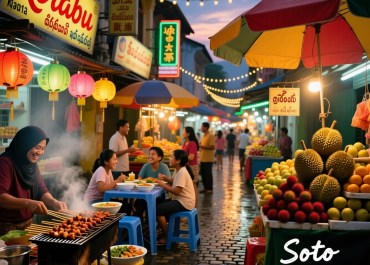Introduction
Eco-tourism in Malaysia is continuously on the rise because many travelers are taking their time to go on meaningfully enriching journeys that respect the natural environment and support community cultures. The country provides a wide range of natural attractions, from rainforests and islands to mountains and cultural villages. These sites enable one to learn about conservation while taking part in activities that encourage responsible travel. In other words, eco-tourism in Malaysia brings a positive experience to travelers wanting to see Malaysia while protecting its environmental and cultural aspects.
Why Choose Eco Tourism in Malaysia
Malaysia is rich in biodiversity and a habitat for orangutans, hornbills, tapirs, and many more. One can also explore marine parks that protect coral reefs and sea life. Ecotourism allows visitors to contribute to local communities with homestays, workshops in culture, and conservation programs. On choosing this type of travel, the benefits last long for the environment and provide experiences beyond just simple sightseeing.
Top Eco-Tourism Destinations in Malaysia
Taman Negara National Park

Source : https://tamannegara.asia/
Taman Negara is one of the oldest rainforests in the world, showcasing a natural setting with wildlife and flora. Some common ways to experience the jungle include canopy walks, guided treks, and river activities. Night trips also present the opportunity to spot animals that move after dark. This destination is suitable for nature lovers who want an authentic outdoor experience.
Borneo in Sabah and Sarawak

Source : https://www.borneoecotours.com/
Borneo offers the most unique eco-tourism adventures with its forests, rivers, and indigenous communities. Travelers can venture into rehabilitation centers that protect orangutans and sun bears. Mulu Caves in Sarawak boast dramatic landscapes and attract a number of visitors from all over the world. Homestays with local communities allow travelers to learn about culture while supporting sustainable tourism programs in the area.
Langkawi Geopark

Source : https://www.langkawigeopark.com.my/
Langkawi Geopark is known for its natural rock formations, mangroves, and protected landscapes. Travelers can be taken on a guided tour through these areas to show them the importance of environmental protection. Eco-friendly resorts encourage responsible travel by minimizing waste and using resources responsibly. The geopark is an ideal place to send nature-loving tourists who also love light adventure activities.
Perhentian Islands

The clear waters, coral reefs, and marine life bring people to the Perhentian Islands. Eco lodges up and down the beaches offer modest comforts, linked with responsible tourism. Visitors can snorkel among turtles and reef sharks on guided tours. There are further opportunities through specific programs of coral restoration that contribute towards marine conservation.
Cameron Highlands

Source : https://www.ecocameron.com/
Cameron Highlands is known for its cool climate, green landscapes, and eco farms. Besides, this place allows travelers to visit tea plantations and community-led trails supporting local businesses. For accommodation, one may look forward to an eco-resort that operates in a responsible manner. It will be a good option for families who seek a quiet retreat amidst nature.
Tips for Responsible Eco Travel in Malaysia
Responsible eco-traveling begins with small but significant actions. Travelers can bring reusable bottles, bags, and containers to reduce plastic waste during their trips. Support local guides and community-based businesses to make sure tourism brings direct benefits to the people living in these destinations. Respecting wildlife, following the rules of safety, and choosing eco-certified accommodation all go to help in preserving Malaysia’s natural heritage for future visitors.
Suggested Eco Travel Itineraries
3 Day Eco Adventure in Taman Negara
Day 1:
It is possible to start traveling from Kuala Lumpur by taking a bus to Taman Negara, which can take travelers in comfort through some of the beautiful villages. Here, one can check into an eco-lodge employing responsible practices like using less energy and staffing locally. It is here that one gets time to rest before embarking on a night safari to view some of those very special animals that show up after sunset. This indeed will make a memorable start for this eco-adventure while at the same time bringing awareness about the importance of forest conservation.
Day 2:
On the second day, tourists get a chance to visit the canopy walk above the forest and understand the various layers of the rainforest. A jungle trek allows detailed insights into the plants, rivers, and wildlife around while understanding the concepts of preservation. Tourists will have a picnic lunch by the river; evening plans could include river rapid shooting to add some adventure to the journey. Activities that not only allow appreciation of nature but provide a good balance of exploration and relaxation.
Day 3:
The final day can start with a visit to an Orang Asli village, where the lifestyle of the indigenous community can be closely observed. This visit offers learning experiences in the form of demonstrations regarding culture and the opportunity to understand traditional knowledge about the forest. Travelers are able to support the community through local handicrafts or activities guided by community members. Later, after the visit, they can get back to Kuala Lumpur, having better insight into eco-tourism and respect for the culture.
Estimated cost: RM500 to RM600.
5 Day Island and Marine Experience in Perhentian Islands
Day 1:
This five-day marine experience starts with a bus ride to Kuala Besut jetty and a subsequent ferry ride to the Perhentian Islands. Besides getting settled into an eco-lodge, travelers appreciate the concept of simple living and holidays that minimize environmental footprint. The serene island atmosphere will help visitors get into the rhythm of nature before the start of activities. This gentle start prepares travelers for the marine adventures that follow.
Day 2:
On the second day, travelers participate in a snorkeling tour to familiarize themselves with turtles, corals, and colorful fishes. The local guides provide information on the protection of marine life and how guests could assist in keeping the reef healthy. Lunch is spent at a beach café for relaxation. Later in the evening, a session on coral restoration will be discussed. This combination of activities will enable travelers to enjoy the island while learning about conservation.
Day 3:
Day three provides an opportunity for a kayaking tour that enables visitors to traverse through serene waters and view even more secluded coves around the island. The expedition allows for physical activity while educating the travelers about the fragile ecosystem surrounding the islands. One can also contribute to a beach cleanup initiative to facilitate the protection of marine life habitats. The day concludes with a dinner of seafood to endorse local fishermen and local business ventures.
Day 4:
The fourth day focuses on cultural experiences through a visit to a local fishing village, showing the daily routines of inhabitants and helping to learn about traditional occupations linked with the sea. A sunset hike offers a scenic view of the island and provides a soothing conclusion to the day. These experiences emphasize the cultural and natural value of the island community.
Day 5:
The final day starts with a leisurely morning swim as travelers get themselves ready for the final boat transfer back to the mainland. This is a slow day that gets them thinking about their marine experiences and the benefits of responsible travel. It gives one time to review knowledge learned from the five-day journey. Travelers leave the island with greater awareness of marine conservation.
Estimated cost: RM800 to RM950.
7 Day Borneo Eco Cultural Journey
Day 1:
The trip begins in Kota Kinabalu, where guests stay in an eco-lodge that offers natural surroundings with responsible operations. The first day provides time to explore the city and prepare for the following activities; this slow start helps travelers get accustomed to the local culture and environment. It will also set the tone for a meaningful eco-cultural experience.
Day 2:
Guided trails and canopy walks through the Kinabalu Park showcase the mountain ecosystem. Travelers will take in the sights of rare flora and bird species of the region. Later, travelers have dinner, which is prepared with fresh local ingredients from surrounding communities. During the course of the day, an appreciation of Sabah’s nature and culture takes shape.
Day 3:
Day three takes the travelers to orangutan and sun bear conservation centers. Visitors learn about rescue programs and the protection of the forest. A homestay in Sandakan provides cultural experiences in the form of family interactions and local food. In this way, it is also an example of supporting rural communities and enhancing notions of sustainable travel.
Day 4:
A river cruise along the Kinabatangan River provides travelers with an opportunity to observe animals, including monkeys, birds, and fireflies. The tranquil setting of the river allows a most relaxing cruise amidst nature. Guides share information about conservation efforts and the importance of protecting river habitats. The day is ended in quiet contemplation on the natural beauty of Borneo.
Day 5:
Travelers fly to Mulu and explore famous Mulu Caves, boasting beautiful rock formations with large underground chambers. The stay in a jungle lodge gives the real feel of staying amidst nature. Visitors learn about geology and natural history of the region. This day contributes to adventure along with education.
Day 6:
A homestay in a longhouse introduces the guest to indigenous culture through traditional craftsmanship, food, and communal activities. Workshops allow visitors to acquire specific skills, like weaving or storytelling. These encounters foster cultural appreciation and contribute to safeguarding traditional knowledge. The longhouse stay fosters economic development among indigenous peoples.
Day 7:
The final day offers a morning handicraft session before travelers prepare for their return to Kuching or Kota Kinabalu. This will be the last activity of the tour that can enable visitors to support local artisans. Travelers leave with memories that reflect both nature and culture. The journey ends with a deeper appreciation of sustainable tourism.
Estimated cost: RM2000 to RM2300.
4 Day Family Friendly Eco Retreat in Cameron Highlands
Day 1:
The family retreat starts with a bus trip from Kuala Lumpur to the Cameron Highlands, which provides a comfortable ride through beautiful areas. Travelers can check into an eco-resort that follows responsible operations and provides tranquility for families. A strawberry farm visit exposes people to local cultivation and simple outdoor activities. This soft start will prepare families for the days ahead.
Day 2:
On the second day, travelers take a tea plantation tour explaining how tea is produced in these highlands. A guided walk along nature trails introduces them to the local environment and community based conservation efforts. Dinner at a family-style restaurant allows the travelers to get together and taste the local food. These activities provide learning experiences and quality time for families.
Day 3:
The third day is devoted to trips to a butterfly garden, and local markets featuring crafts and produce. Families can take in these sights and shops, even while helping small vendors in the community. Hours at an eco-farm allow visitors the opportunity to learn about sustainable agriculture by participating in it hands-on. This day combines education with leisure in a serene atmosphere.
Day 4:
The last day begins with a slow morning where families can enjoy the cool weather and green landscapes. Travelers may also make short walks or spend their time in the resort before setting off to return to Kuala Lumpur. This gentle end to the retreat offers the families time to reflect on their time in the highlands, and it reinforces the value of nature-based holidays.
Estimated cost: RM700 to RM850.
FAQ
Q: Is eco tourism in Malaysia expensive?
A: Eco tourism can be budget-friendly; lots of eco-lodges or homestays offer relatively simple stays at reasonable rates. Travelers can plan their trips in relation to budget and still enjoy quality experiences. Malaysia provides many options for visitors who want responsible travel without high expenses.
Q: Are families able to enjoy eco-tourism?
A: Most destinations in eco tourism have safe and meaningful activities that can be enjoyed by the whole family, such as nature walks, snorkeling, or visits to various cultures. These activities aid children in learning about nature and ways of improving quality time with family members. Eco travel is well-balanced for visitors of all ages.
Q: What is the best season for eco travel in Malaysia?
A: The best time is from March to October; this period is usually dry. It offers excellent conditions for outdoor activities, taking a tour, and visiting the islands. Itineraries for travelers would run smoothly and without major interruptions in weather.
Conclusion
Ecotourism in Malaysia offers the voyager a glimpse into nature, culture, and wildlife, while at the same time embracing responsible travel. The destinations throughout the country offer experiences with rainforests, marine parks, mountains, and community visits. Travelers leave with meaningful memories that reflect appreciation and respect for Malaysia’s natural heritage. Choosing eco-friendly practices means future generations can continue to enjoy the beauty of the country in a sustainable manner.





